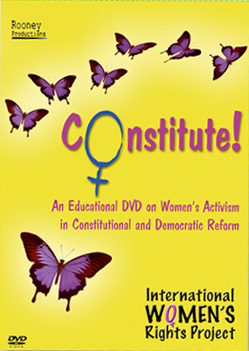Putting Feminism on the Agenda
November 2006 marked the 15th anniversary of the conference and subsequent publication of Putting Women on the Agenda. This was the first regional conference held to galvinize the struggle for women’s rights in the possibility of a new constitutional dispensation in South Africa. Together with others that followed, it was a significant event in the development of the South African women’s movement as a place for engaging the new democracy: network building and consolidation, formulation of policy and advocacy strategies, legislative drafting, consultation on the creation of the national gender machinery; and providing support for women who moved from activism to the state.
That conference was attended by over 450 academics, activists, lawyers, judges, law professors, ANC members returning from exile, representatives from NGOs and participants from the Southern African region. Many went on to help shape the Constitution and the laws that would create the new democratic South Africa and many have become significant players in the new South Africa.
Senakangwedi – Access to Justice for Rural Women
Senakangwedi is the South African NGO partner with IWRP on the Access to Justice for Rural Women project. This pilot project, funded by USAID, addresses issues of HIV/AIDS, inheritance, maintenance, violence against women and girls, and other issues impacting on women in the small rural community of Moratele in the North West Province. A local women’s rights forum has been created, which works with the traditional elders and tribal council so that the community can address gender inequality issues on its own. Small local workshops are held on significant days such as Human Rights Day and Women’s Day, as well as a program for the 16 Days of Activism on Violence Against Women. Community radio programs in Tswana have been developed by the community on awareness of these issues.
South Africa Case Study
This brief study surveys the development of women’s rights in South Africa, during three distinct periods of time – the apartheid regime, prior to democratization (pre-1994), the constitutional negotiating and growth process (the 1990s), and women’s progress in South Africa (post-2000).
View Pdf
The African Gender Development Index
IWRP provided consulting, research and editing services to the Centre for Applied Legal Studies in the completion of the South African pilot of the AGDI. The Economic Commission on Africa designed the AGDI as an important tool for informing regional and global processes on the situation and the status of women in Africa. AGDI is a composite index composed of two parts, the Gender Status Index (GSI) and the African Women’s Progress Scoreboard (AWPS) rather than a collection of individual statistics. AGDI is a specifically African index with its emphasis on the major African charters and documents that have a bearing on gender relations and women’s empowerment. AGDI will provide a mechanism for measuring the status of women as compared to men’s in the social, economic and political spheres. In developing this index, ECA hopes to achieve the following objectives:
• To provide African policymakers and their partners with an appropriate tool to measure gender equality and equity, and women’s empowerment and advancement;
• To help monitor the progress made in implementing conventions that African countries have ratified;
• To democratize statistics and qualitative monitoring tools that are easy to use and are effective; and
• To stimulate interdepartmental cooperation within the Ministries in which it will be applied.
The two components of AGDI:
• Gender Status Index (GSI), which captures quantitatively measurable issues related to gender equality. It is based on three blocs: social power ‘capabilities’, economic power ‘opportunities’ and political power ‘agency’.
• African Women’s Progress Scoreboard (AWPS), which measures government policy performance regarding women’s advancement and empowerment. It focuses on qualitative issues and fills the gap between purely quantitative indicators, such as those contained in the GSI, and more country-specific or sector-specific indicators, or those related to decision-making and well-being at household and individual level. The AWPS is composed of four blocks, namely, women’s rights, social power ‘capabilities’, economic power ‘opportunities’ and political power ‘agency’.
GSI and AWSP combine both quantitative and qualitative indicators. Thus, AGDI is a strategic tool for stimulating the process of community participation and enhancing political awareness of gender issues.
Grandmothers
IWRP has worked with Rooney Productions on the documentary The Great Granny Revolution about support networks of grandmothers in Canada supporting grandmothers in South Africa who are raising their grandchildren who have lost their parents to HIV/AIDS. IWRP-SA is using this film to inspire workshops in South Africa on setting up granny groups in Johannesburg and Alexandra Township. IWRP-SA worked with the Cities of Johannesburg in March 2008 and Pretoria in September 2008, along with the Canadian High Commission, establishing training programs for granny support groups and social development policies.
South African Case Study
This brief study surveys the development of women’s rights in South Africa, during three distinct periods of time – the apartheid regime, prior to democratization (pre-1994), the constitutional negotiating and growth process (the 1990s), and women’s progress in South Africa (post-2000).
